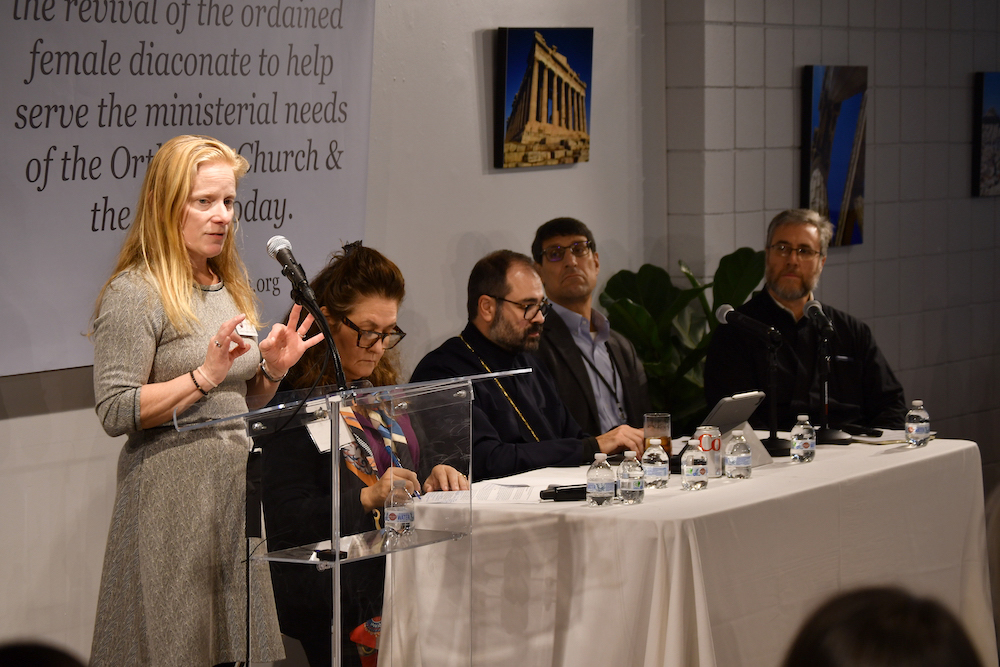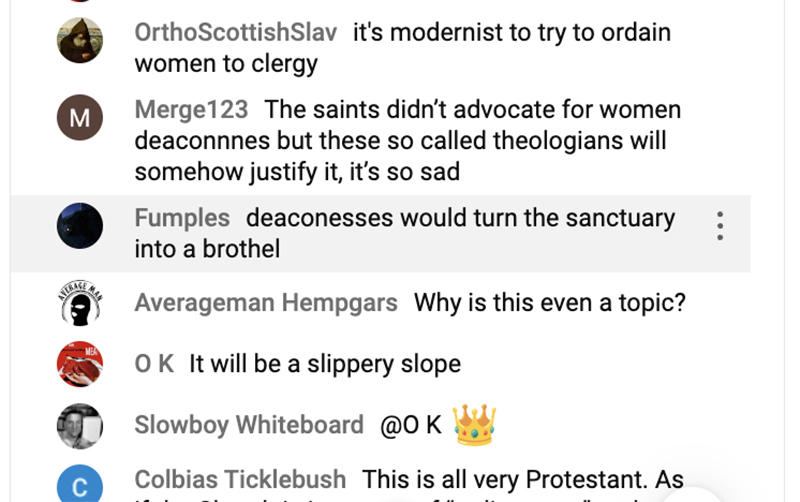
(RNS) — Soon after the live broadcast began on Ancient Faith Radio, a media ministry aimed at Orthodox Christian listeners, the real-time commentary open to listeners on YouTube erupted with a stream of misogyny.
The topic of the Jan. 30 broadcast, which included a pre-recorded radio documentary, was examining the call to restore female deacons in the Orthodox Church. Deacons make up the lowest and third order of clergy in the Orthodox Church, and not every parish has them. Where they exist, deacons primarily assist the priest with liturgical duties such as preparing the Eucharist and are almost always exclusively male.
“Why should I care about women trying to subvert the major orders?” asked one commenter.
“This is such a joke,” opined an opponent, while another chimed in that the subject was too sensitive for their 17-year-old son, and another cited St. Paul as saying, “women should stay silent because they talk too much and are too opinionated in Church.”
Yet another was plainer in their bias: “Deaconesses would turn the sanctuary into a brothel.”
Far from clarifying the question of women deacons, the episode added fuel to an already incendiary conversation about women’s ordination and the role of women in the church in general.
The Ancient Faith show was a response to a November symposium sponsored by the St. Phoebe Center for the Deaconess, a 10-year-old Orthodox group advocating for the female diaconate. At the meeting outside Boston, Orthodox scholars proposed guidelines under which the ancient practice could be revived. The church has never formally banned women from the diaconate, but with increasing emphasis on male monastic practice in the Middle Ages, the practice faded.

Carrie Frederick Frost, left, addresses a symposium on women deacons held Nov. 10-12, 2023, at Hellenic College Holy Cross Greek Orthodox School of Theology and St. Mary Orthodox Church in Brookline, Mass. (Photo by Sarah Riccardi-Swartz and JD Swartz/St. Phoebe Center)
The symposium received “best wishes” from the Ecumenical Patriarch Bartholomew I, the first among equals among Eastern Orthodox patriarchs, as well as a blessing from Archbishop Elpidophoros, head of the Greek Orthodox Archdiocese of America.
In a meeting with St. Phoebe representatives on Feb. 2, Elpidophoros expressed support for expanding women’s visibility in the church, giving his blessing to including lay girls and women in liturgical processions. But Metropolitan Saba, leader of the Antiochian Orthodox Christian Archdiocese of North America, the sponsor of Ancient Faith Radio, has taken a more conservative approach, quietly admonishing at least one parish that encouraged female participation in the liturgical procession.
On the Ancient Faith show on female deacons, Metropolitan Saba questioned whether the timing of the discussion was driven by the church’s needs or by feminism. “Do we need (the) deaconess now because we want to activate pastoral ministry in the church, because our complicated society needs many new ministries, many workers in the field of God?” he asked. “Or because we are motivated or influenced by the humanistic movements which are everywhere now and in all the media?”
Supporters of the female diaconate argue that ordained women can better pastorally care for other women suffering from sexual abuse, miscarriages, still births and other traumas particular to women.
In a Feb. 3 statement, the St. Phoebe Center expressed appreciation for the program but said some of its board members have received verbal attacks even beyond what viewers saw in the chat.
“I couldn’t believe how outrageous the comments from most of the audience were,” said Valerie Karras, an adjunct lecturer at Eden Theological Seminary and a St. Phoebe board member. She described the comments as “historically and theologically ignorant,” as well as “condescending, obnoxious, vitriolic, free with ad hominem attacks” and “misogynistic.”

Some of the live chat comments from the Ancient Faith Today Live episode “The Orthodox Deaconess: Examining the Call for Restoration” on Jan. 30, 2024. (Screen grab)
“It was no surprise to me that it appeared that quite a few were converts, some of them recent,” she added.
Karras was one of 16 Orthodox theologians and scholars who appeared on the program, giving a wide range of perspectives. The other experts interviewed included Western Washington University Professor Carrie Frost, writer Frederica Matthewes-Green, University of San Diego Professor Jeannie Constantinou and the Rev. Stephen De Young, a pastor and author.
In the end, the Ancient Faith program seemed to satisfy no one. Representatives of St. Phoebe said the program betrayed a firm bias against female deacons, accusing one of the show’s hosts, the Rev. Thomas Soroka, rector of a Pittsburgh-area Orthodox congregation, of presenting supporters of the female diaconate as a fringe group. Critics in the chat expressed dismay that Ancient Faith hosted a dialogue at all on the topic.
Soroka said on air that it is important to give advocates for deaconesses “a fair shake” and to bring experts on who can discuss, explain and refute.
Supporters also argued that a segment on the show addressing female priesthood clouded the discussion. “Orthodox doctrine and practice clearly distinguish between the diaconate and the priesthood, and our topic here was not priesthood, much less ordination of women to that order,” a statement from the St. Phoebe Center read.
Panelists who opposed restoring the female diaconate argued that women already serve other women’s needs without ordination and pointed to a seeming lack of interest in a revival of the practice.
“It is not impossible for the Holy Spirit to inspire the recovery of deaconesses,” said Matthewes-Green in a Facebook post after the program. “But in a situation like this, where we see less than unity, even less than interest in the topic, this looks like the Holy Spirit is *not* leading us to renew the role of deaconess — not at this date, anyway.”
At the end of the broadcast in which listeners were invited to call in, Soroka and his co-host, John Maddex, warmly welcomed the Rev. John Whiteford, archpriest of St. Jonah Orthodox Church in Spring, Texas. Whiteford compared the deaconess movement to a sexual predator, arguing a slippery slope fallacy.
“They say, well, we’re not pushing for women priests, we’re only talking about deaconesses,” he said. “And I’m very tempted to use a very crass reference to what guys often try to do to pressure women when they’re out in the back seat of a car, but you know, you say I just want to go this far, but no further, but once you get there, then what happens?”
Ancient Faith edited out his comment, but Whiteford posted the clip on social media site X.
“Women in the Church should never be denigrated or dismissed in any way,” Soroka said in a Jan. 31 post on Facebook. He continued: “Orthodox theology should articulate, clearly, the traditional theological understanding of male and female, especially in response to modern challenges to sex and gender, gender roles, and family life.”
Barbara Gulina, a priest’s daughter and advocate for deaconesses and abuse victims in the Orthodox Church, also dialed into the program. She told the hosts she feels called by the Holy Spirit to the female diaconate and asked Soroka what women like her should do with that calling. Soroka advised that she consult with her priest and consider other ways to serve without ordination.
“The way that my question was answered is a major reason why women who are called to this type of ministry stay silent in the Orthodox Church,” she said. “If they do find the courage to express that they feel called to the diaconate, the best-case scenario is that they get discouraged. Worst case, they get reprimanded, bullied, and pushed out. And in many cases, women decide to leave the Orthodox Church altogether.”
Beyond the live broadcast, Ancient Faith published the full interviews of each panelist on its website.
Source link






